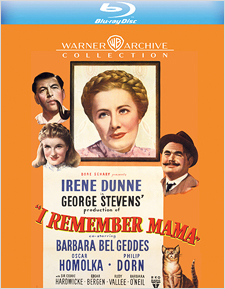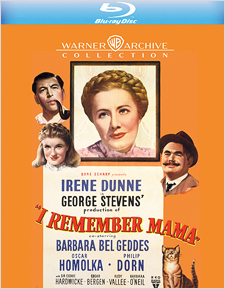I Remember Mama (Blu-ray Review)

Director
George StevensRelease Date(s)
1948 (October 1, 2024)Studio(s)
RKO Radio Pictures (Warner Archive Collection)- Film/Program Grade: A-
- Video Grade: A
- Audio Grade: A
- Extras Grade: D-
Review
The film I Remember Mama is based on the play by John Van Druten which, in turn, was based on Kathryn Forbes’ novel Mama’s Bank Account. A TV show called simply Mama ran on CBS in the early 50s and a musical of the story ran on Broadway in 1979. Directed by George Stevens in 1948, the film features an outstanding cast and was nominated for five Academy Awards.
I Remember Mama unfolds in nostalgic episodes about a Norwegian-American family named Hanson living in San Francisco around 1910. Katrin Hanson (Barbara Bel Geddes, Vertigo) sits by a window, recalling events in her childhood. Marta/Mama (Irene Dunne, My Favorite Wife) and Lars/Papa (Philip Dorn, Passage to Marseille) still retain their Norwegian accents. They live with their children Nels (Steve Brown, Tomorrow, the World!), Katrin, Christine (Peggy McIntire, El Paso), and Dagmar (June Hedin, The Member of the Wedding). Every Saturday night, the family gathers around the kitchen table as Mama counts Lars’ wages for the week and apportions it for rent, groceries, and the children’s needs. If the money covers everything, Mama states, “Is good. We don’t have to go to the bank.”
For extra income, the Hansons have a border, Mr. Hyde (Cedric Hardwicke, The Lodger), an elderly gentleman who reads to the family each evening from Dickens and Shakespeare.
The film opens with Marta’s sister Trina (Ellen Corby, Here Comes the Groom) frantically rushing to the Hanson home. She wants to get married but she’s afraid the other sisters will laugh at her intended—the undertaker Peter Thorkelson (Edgar Bergen, The Goldwyn Follies). Marta calms her down, agrees to speak to their sisters, and assures Trina they will not laugh at her.
It’s not long before the persnickety sisters, Jenny (Hope Landin, The Sun Comes Up)—an imperious sourpuss—and timid Sigrid (Edith Evanson, It Happens Every Thursday) march up to the Hanson doorstep. Old Uncle Chris (Oscar Homolka, Mission to Moscow), soon arrives bellowing as usual, wickedly pleased that his loud outbursts intimidate Jenny and Sigrid.
As with Meet Me in St. Louis, another family picture made four years earlier, I Remember Mama takes us through various events in the Hanson household, some minor, others serious. Nels tells his parents he’d like to go to high school and a family roundtable must decide whether they can afford the expenses. Dagmar’s pet cat becomes very ill and the only humane thing to do is to put it out of its misery, the task falling to Mama. Uncle Chris’ “housekeeper” Jessie Brown (Barbara O’Neil, Gone with the Wind), shunned by the rest of the family, is seen for the caring person she is. Katrin hopes to receive a dresser set for her graduation present but Mama has her heart set on giving her a family heirloom brooch.
Always, Mama’s warmth, common sense, and intelligence get the family through touchy situations. The biggest crisis comes when Dagmar is diagnosed by Dr. Johnson (Rudy Vallee, Too Many Blondes) with mastoiditis and requires an operation. Mama promises Dagmar to be at her bedside when she awakes from the anesthesia but she’s prevented by hospital policy that surgical patients may not have visitors for 24 hours. To keep her promise, Mama devises a subterfuge to visit Dagmar undiscovered.
As Marta Hanson, Dunne comes across as a strong-willed, caring, practical, smart woman who loves her family. Marta doesn’t shy from adversity and acts as a role model without being judgmental or overbearing. Dunne plays her with twinkle in her eye when Marta approaches famous author Florence Dana Moorhead (Florence Bates, On the Town) to seek advice on behalf of Katrin, who aspires to be a writer. Since the author is also a fan of good food and one Norwegian specialty in particular, Mama bribes her with a secret family recipe for the dish if she will read one of Katrin’s stories and give her some advice. Miss Moorhead is so favorably impressed that she reads several stories and offers this advice: write what you know about.
The other performances are similarly first-rate. Ellen Corby, Grandma on TV’s The Waltons, shows her acting range as the nervous Aunt Trina. Bel Geddes’ narration opens the film and is heard periodically to bridge episodes, recalling Katrin’s childhood days with her family. Homolka is appropriately over the top as the thundering Uncle Chris with a soft heart for the right people. Hardwicke’s Mr. Hyde is a gentle, down-on-his-luck lover of literature who shares his appreciation with a receptive audience. Bergen’s Thorkelson is amusing in his timidity and seems the ideal match for Trina. Vallee’s doctor is gentle with Dagmar and firm against Uncle Chris’ attempt to challenge his decisions. O’Neil conveys a quiet dignity as Jessie Brown, Uncle Chris’ companion.
The screenplay by Dewitt Bodeen may seem quaint since movie families these days are typically dysfunctional. I Remember Mama harks back to a time when audiences embraced such films because they portrayed an ideal of family life. The conflicts here aren’t earth-shaking but the type faced by all families—money, relationships, setting goals, illness, death, jealousy, and compassion.
I Remember Mama would be overshadowed by future films directed by George Stevens, including A Place in the Sun, Shane, Giant, and The Diary of Anne Frank, but it’s one of the finest ensemble pictures of the 1940s. Stevens gives each character in the large cast enough screen time to assure that their personalities are conveyed. He infuses the film with a gentleness and genuineness that never come off as treacly or condescending. He likes and respects these people and that affection shines through in his direction and the beautifully crafted performances.
I Remember Mama was shot by director of photography Nicholas Masuraca on 35 mm black & white film with spherical lenses, finished photochemically, and presented in the Academy aspect ratio of 1.37:1. This Blu-ray release, which contains a 4K scan of the nitrate negative, stands with other Warner Archive releases in presenting this film in nearly pristine condition. Clarity is excellent. I couldn’t see any dirt specks, scratches, or other imperfections. Details are well delineated. Black levels are deep and velvety. A major way of bridging the present, as Katrin recalls her childhood days, with the past as the events happen, is the use of a mirror to reflect her memories. The street on which the Hansons live is on a hill, and often characters are seen walking up or down that hill, its sharp pitch common to streets of San Francisco.
The soundtrack is English 2.0 Mono DTS-HD Master Audio. Optional English SDH subtitles are available. Dialogue is clear and distinct. Irene Dunne and Philip Dorn speak with an accent suggesting Norwegian heritage, as do the other actors portraying immigrants from Norway. Sound effects include a streetcar, the mewing of a cat, and general hustle- bustle in the Hanson household. The score by studio fixture Roy Webb is low-key and somewhat sentimental while avoiding obvious attempts to manipulate.
This Blu-ray release from the Warner Archive Collection contains only one bonus item:
- Theatrical Trailer (1:48)
I Remember Mama is a lovely film that combines drama with humor, a bit of suspense, and a number of poignant moments. Irene Dunne is outstanding as Mama Hanson, etching an indelible character while never overshadowing the other actors, and Stevens has elicited uniformly fine performances from the rest of the cast. The theme of selflessness rings through the film, epitomized by Marta’s putting the needs of her family above her own, Uncle Chris’ looking after his grand-nephew Arne in the hospital, and Katrin’s putting the happiness of others above her own. At over two hours, there are places where the film could have been cut without diluting its impact, but overall this is an engaging look at an immigrant family’s day-to-day life in the early twentieth century.
- Dennis Seuling

